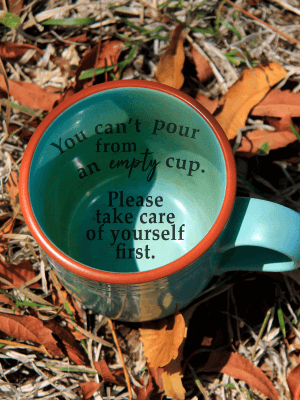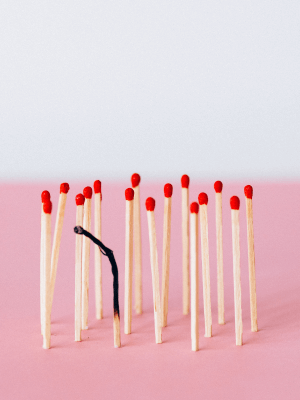How To Practice Self-Love?
By Dr Olena Edwards
The topic of self-love comes up in therapy quite frequently. A lot of clients ask how to practice self-love and find it quite confusing, so we explore the following questions:
- Isn’t self-love selfish?
- How much should I love myself?
- What is the healthy measure of self-love?
- Do I put myself first or do I put the other first?
- Is self-love a part of narcissistic personality disorder?
Metaphor for Self-Love
When we reach the point of exploring self-love, I like to use the image or metaphor of an overflowing cup. It is a very simple concept: the cup will overflow if it is full to the brim. We can only attempt to attend properly to the needs and expectations of others, including our closest loved ones, when our own cup is full. When it overflows, we are in the right place physically, emotionally, and mentally to share and give love and care generously for others.
 When our cup is dry or half full, we are deficient in self-love. A lot of clients ask me then, “So where do I start practicing self-love in a healthy way?”. I like to say, rightly or wrongly, that self-love starts from being able to say no and putting your priorities first. Of course, in a mindful and considerate way. There is a myriad of examples that we can look at, and probably the most common one is being overcommitted with work and our social diaries. This ultimately comes to the detriment of our mental health. We end up being unable to engage properly, to be fully present and productive due to fatigue, self-inflicted pressure, and irritability.
When our cup is dry or half full, we are deficient in self-love. A lot of clients ask me then, “So where do I start practicing self-love in a healthy way?”. I like to say, rightly or wrongly, that self-love starts from being able to say no and putting your priorities first. Of course, in a mindful and considerate way. There is a myriad of examples that we can look at, and probably the most common one is being overcommitted with work and our social diaries. This ultimately comes to the detriment of our mental health. We end up being unable to engage properly, to be fully present and productive due to fatigue, self-inflicted pressure, and irritability.
What pushes us to say yes to all the invitations, requests, demands, and external expectations is the fear of rejection or being judged. The result of it, we start sacrificing and violating our own boundaries and well-being due to our lack of assertiveness. Our cup is getting dry.
However, if we start actively practicing being assertive and polite in saying no when we feel that it is too much, we do notice the difference. It helps us to remove the layer of pressure, which quite often is self-inflicted. Those friends who genuinely love and care about us would understand and support us. They will respect our needs and healthy boundaries as we should equally respect theirs.
Is Self-Love Selfish?
It is not surprising that ‘no’ is the favourite word of most two-year-olds who are intrinsically narcissistic as a part of their development. Their self-love is their top priority as it defines their newly discovered sense of autonomy. It is really important to remember that well-being is a skill. Self-love is a big part of it as it helps us to support and maintain it. Going through trials and tribulations of our daily life, we all operate within our window of tolerance, a brilliant concept developed by Dan Siegel, an American professor of Psychiatry.
I look at self-love as a way to help us maintain our window of tolerance. Hence, it is not a selfish thing but a life skill, a part of conscious well-being practice. We maintain our window of tolerance and practice self-love by having our routines and boundaries in place. Also by practicing our little personal rituals that make us happy, give us a break, a breather, uplift us. However small or insignificant they are, as long as they are the ones that are individually meaningful.
A way of practicing self-love could be having your weekly massage or playing football as me-time. Anything as little as stroking your cat and feeling in the moment. Cooking your favourite meal, if cooking is your thing. My mother used to talk to her plants, and that was her way of practicing self-love. It is very individual and really depends on what is your thing.
For example, I have a client who does Thai boxing weekly, when he has a reporting period at work, he does it bi-weekly as he needs a more frequent outlet for his stress. This is his way of attending to his needs and practicing self-love.

Burnout?
I work a lot with people who reach burnout and I had it myself. It is really a very extreme indication of how deficient of self-love they have become and how dry their cup is. Can we call burnout an outcome of a consistent lack of self-love? Well, in my view, we should.
There is a very good book by a postmodern philosopher, BC Han, which is called ‘Burnout Society’. He investigates the achievement culture of the world that we live in. The culture that demands us to actively suppress our need for self-love and well-being, and sacrifice it for being able to achieve, achieve, and achieve. Which ultimately leads to burnout as the achievement drive becomes our ultimate internalised overriding narrative.
It is so extreme that it leaves no space for playfulness, curiosity, joy, spontaneity, and good humour. For friendship or any other meaningful relationship, as we become completely exhausted trying to overachieve to feel validated.
Self-Compassion
As the world and our society become progressively intolerant and more and more judgmental, it is really important that we consciously and consistently cultivate kindness and compassion, with self-compassion being a form of self-love.
As Canadian psychiatrist, Dr. Gabor Mate noted with regards to an exponentially growing number of addictions, our world is becoming progressively unkind. It is becoming progressively unkind to the point where we confuse self-love and self-harm. Never have beauty enhancement treatments and surgery, some of it quite dangerous, reached such huge proportions. We cut and stuff our bodies to shape them to feel happy. We inject ink under our skin to look more attractive and feel more desirable. When we feel desired, we feel chosen, we feel noticed, appreciated, and loved.
Choose You By Practicing Self-Love
So self-love is a hugely important concept if it is practiced and understood within the right framework. When we choose ourselves, we appreciate ourselves for who we are. We spend time to know ourselves. We make an effort to respect ourselves. To me, self-love reflects our basic need for a balanced good life. A good margin to be curious, adventurous, spontaneous, playful, funny, and vulnerable.
Self-love is hugely important, especially now in our postmodern society. If we practice self-love and self-compassion, we will be more able to be happy and resilient to the demands of external pressures imposed upon us, which are getting more and more relentless. An interesting fact, in 2015, the world-leading economist produced the first world happiness report. The report underpins four main characteristics of well-being, and they are resilience, innate basic goodness, generosity, and attention. I would definitely add point number five as self-love. Self-love as a skill to practice a balanced, rich, and diverse way of living. With it we will have the opportunity to grow and impact our communities and the world in a positive way.
Well, the basic thing to remember about self-love is: we cannot take proper care of others if we can’t take good care of ourselves.
Seeking support is not only a sign of strength but also a courageous step toward personal healing and growth. It is an empowering act of self-love. If you believe that you could benefit from the guidance of our expert therapists, we encourage you to explore the range of services from Harley Therapy, such as person-centered therapy or integrative therapy.





I hate my self after being sexually abused and abused and assaulted by my parents and neighbour opposite my front door. I am 53 now but my abuse from 17-40. I’VE won’t to kill myself. I have physical a lot since birth with epilepsy etc and mental health problems for years.
GOD LOVES YOU. Accept His love. It’s all you need I assure you.👌🏾✝️💫